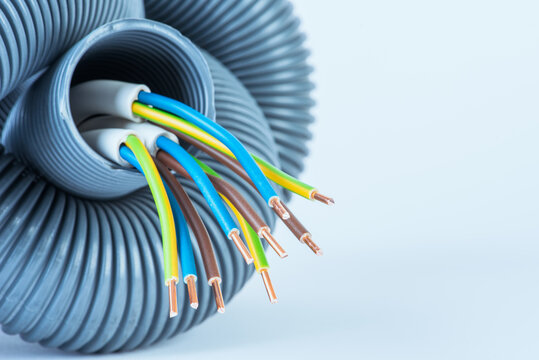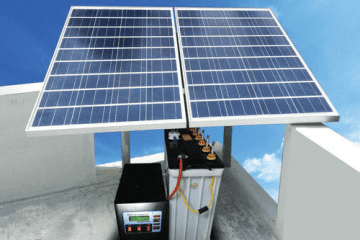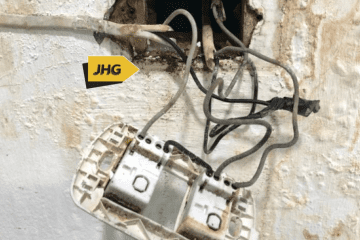At Just HardRich Global Resources Limited, we know how critical it is to get your electrical installations right the first time. Whether you’re planning a major construction project or handling minor wiring needs, the importance of selecting the correct electrical conduit cannot be overstated. The right conduit offers protection and durability for your wiring, ensuring safety, longevity, and compliance with local codes.
Let’s delve into the seven common types of electrical conduits, their applications, and why they are essential for your projects. These conduits can be broadly categorized into metal conduits and non-metal conduits. Each type has its unique benefits and specific applications, which we’ll break down for you.
What Is an Electrical Conduit?
An electrical conduit is a protective tubing (plastic or metallic) used to route and safeguard electrical wiring in various installations. They are indispensable in locations where electrical cables are exposed, such as in basements, exterior walls, attics, and even outdoor spaces. At Just HardRich Global Resources Limited, we always stress the importance of using the correct conduit to ensure the longevity of your electrical systems, particularly in Nigeria’s harsh climate. Conduits not only shield your cables from environmental damage but also protect against accidental impacts.
Electrical conduit installations must strictly follow the National Electrical Code (NEC) and other relevant local electrical codes. When properly installed with compatible fittings such as elbows, connectors, couplings, and boxes, conduits provide an essential layer of protection and organization to any wiring system.
1. Rigid Metal Conduit (RMC)
Rigid Metal Conduit (RMC) is one of the most robust types of conduits you can find. It’s made from materials such as stainless steel, coated steel, or aluminum, making it a durable choice for environments where the wiring is exposed to mechanical damage or extreme conditions.
- Strength and Durability: Due to its thick walls, RMC offers an unparalleled level of protection against impact, making it ideal for industrial settings or outdoor installations.
- Corrosion Resistance: Most RMCs come galvanized or coated with PVC to resist corrosion, especially in areas prone to water or chemical exposure. For example, PVC-coated aluminum RMC is great for environments with harsh chemicals like coastal areas or chemical plants.
- Applications: RMC is perfect for commercial and industrial installations where heavy-duty protection is paramount. It’s a great option for environments that may experience high levels of electromagnetic interference (EMI), as the thick metal walls provide EMI shielding.
At Just HardRich Global Resources Limited, we use RMC for installations where robust protection is necessary, especially for outdoor and industrial projects across Nigeria.
2. Flexible Metal Conduit (FMC)
Flexible Metal Conduit (FMC) is designed for scenarios where a rigid conduit just won’t work. Its coiled, interlocking metallic strips allow it to bend and flex, making it ideal for installations where flexibility is key.
- Flexible and Practical: FMC is perfect for applications where vibrations need to be absorbed, like in environments with motors or machinery. Its ability to flex makes it a go-to for installations in confined spaces or areas where rigid conduits would be too difficult to work with.
- Typical Uses: FMC is typically used in dry areas but is not suitable for outdoor or wet environments. It’s common in places like attics, crawl spaces, and areas where vibrations or movements could otherwise damage a more rigid system.
At Just HardRich Global Resources Limited, we leverage the flexibility of FMC for indoor projects where adaptability and ease of installation are paramount.
3. Intermediate Metal Conduit (IMC)
Intermediate Metal Conduit (IMC) is a lighter, thinner version of the Rigid Metal Conduit but offers comparable protection. IMC is often preferred for large-scale projects because it’s easier to work with and more economical.
- Cost-Effective Durability: IMC provides a solid balance between cost, weight, and protection. It’s a great choice for commercial and residential projects that require a durable conduit without the bulk of RMC.
- Versatility: Despite being lighter, IMC can be used in both indoor and outdoor applications. It’s ideal for projects where weight is a concern but where you still need a high degree of protection.
At Just HardRich Global Resources Limited, we often recommend IMC for budget-conscious projects that still need reliable protection, particularly in large-scale construction and industrial applications.
4. Liquid-Tight Flexible Metal Conduit (LFMC)
Liquid-Tight Flexible Metal Conduit (LFMC) takes the benefits of FMC and adds a layer of protection against water, making it ideal for outdoor and wet environments.
- Waterproof: With its plastic coating and sealed fittings, LFMC provides excellent protection in locations where water and moisture are a concern. This makes it perfect for outdoor equipment, such as air conditioning units or outdoor lighting.
- Durability: Despite its flexibility, LFMC is still strong enough to protect against mechanical damage, and the liquid-tight design ensures that moisture won’t penetrate and cause electrical failures.
At Just HardRich Global Resources Limited, we rely on LFMC for projects involving external equipment installations where moisture protection is critical.
5. Electrical Metallic Tubing (EMT)
Electrical Metallic Tubing (EMT), also known as “thin-walled conduit,” is lighter and easier to work with than RMC or IMC. It’s made from galvanized steel or aluminum and is bendable, which makes it great for indoor applications.
- Lightweight and Bendable: EMT is easy to work with, and its thin walls allow it to be bent with a specialized tube-bender. This makes it a great option for complex wiring projects that require precision.
- Common Applications: EMT is widely used for indoor wiring in commercial and residential settings. Although it’s not as durable as RMC or IMC, its lightweight construction makes it a favorite for areas where mechanical damage is less likely.
At Just HardRich Global Resources Limited, we recommend EMT for indoor installations where ease of installation and flexibility are needed, especially in residential and commercial buildings across Nigeria.
6. Electrical Non-Metallic Tubing (ENT)
Electrical Non-Metallic Tubing (ENT) is a flexible, plastic tubing that is flame-retardant and moisture-resistant. It’s ideal for applications where flexibility and ease of installation are critical.
- Non-Metallic and Versatile: ENT can be bent easily and installed using glued plastic fittings or snap locks, making it suitable for complex installation areas where metallic conduits would be impractical. It’s commonly used in standard wood-frame or metal-frame walls.
- Indoor Use: ENT is primarily for indoor use, often within walls or concrete block structures. It cannot be used in outdoor settings or areas with high exposure to physical stress.
At Just HardRich Global Resources Limited, we use ENT in projects where flexibility and fire-resistance are key, particularly in indoor installations within residential structures.
7. Rigid PVC Conduit
Rigid Polyvinyl Chloride (PVC) Conduit is a plastic conduit commonly used for underground and outdoor applications. It’s highly resistant to water and other environmental factors, making it an excellent choice for outdoor installations.
- Weather and Water Resistant: PVC conduits are glued together, creating a watertight seal. This makes it an ideal choice for underground installations or areas exposed to water, such as buried electrical lines or outdoor applications.
- Corrosion-Free: Unlike metal conduits, PVC won’t corrode when exposed to water, chemicals, or salt, making it perfect for harsh environments.
At Just HardRich Global Resources Limited, we frequently use rigid PVC conduit for outdoor projects that require durability in the face of moisture and harsh conditions, particularly for underground wiring.
Choosing the Right Electrical Conduit for Your Project
Choosing the right electrical conduit depends on several factors, including location, environment, and your project’s specific needs. At Just HardRich Global Resources Limited, we guide our clients through this decision process to ensure the highest level of safety and efficiency in their installations.
- For indoor wiring: Electrical metallic tubing (EMT) or electrical non-metallic tubing (ENT) are the best options for their flexibility and ease of use.
- For outdoor or underground applications: Rigid PVC or Liquid-tight flexible metal conduit (LFMC) will provide the best protection against moisture and harsh conditions.
- For heavy-duty industrial applications: Rigid metal conduit (RMC) or intermediate metal conduit (IMC) offers the strength and protection needed for high-stress environments.
Just HardRich Global Resources Limited is committed to delivering world-class electrical power and control engineering solutions. Our extensive knowledge of conduit systems, paired with our dedication to quality and safety, ensures that your electrical installations are protected, compliant, and built to last. Reach out to us today, and let’s power your projects with precision and expertise.




